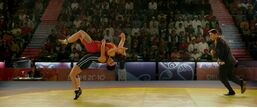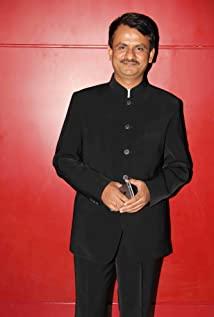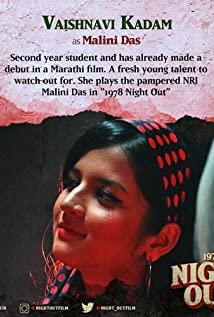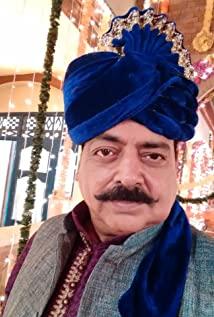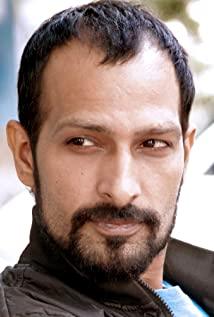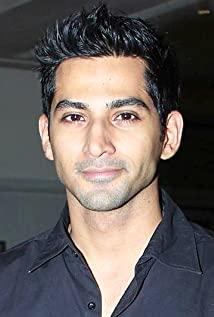*The following are all spoilers. I already knew this movie before I watched it, and it was controversial because the father imposed his dream on his daughter, which certainly makes sense, but if you think about it, even the father's younger brother would say "I don't agree, but I Don't dare to say", in a small Indian village where the fate of the nephew is determined by the uncle who has more "speaking power", doesn't this kind of daughter whose fate is determined by her father feel quite real? — not to mention that it’s really a true story. Besides, to be honest, does the first person to break with patriarchy really need no external force? It is not easy for an ordinary person to succeed. What kind of winner in life does not have a hard-hearted coach/parent? ——Not to mention that this is just a little girl in a backward village in India. Remember what the little girl who married at the age of 14 said: at least your father sees you as daughters, and sees you as his heirs to inherit his dreams, rather than a commodity to earn dowry. Remember the little girl who shouted "India must win" at the end of the film? What she shouted was not "India must win", but "Girls can bring victory to India". Remember the data at the end of the film that the guitar and Babita inspired thousands of Indian girls to learn to wrestle and refuse to be married and have children? Doesn't all this make more sense than discussing whether the father killed his daughter's qualifications to be a "qualified" woman in the eyes of others? Who says women have to wear headscarves? Who says a woman has to be like a "woman"? ok now you tell me what a girl is supposed to look like? If this question asked me to ask Babita, ask Gita, we would say: I'm a girl. So a girl can look like whatever I look like. A saying that I've always found particularly true: if you think feminist is a too powerful word, then maybe it's your own problem to solve. Let's start with how Geeta got on the road of wrestling. Everyone is probably missing the point: When did Dad start thinking that Geeta and Babita were born wrestlers? It was because they saw Geeta and Babita beat up the boys so badly. ——There are at least two meanings here: 1. Geeta and Babita have shown their movement talent in wrestling; 2. Geeta and Babita are in the process of conquering their opponents (later two people replayed it with kindness) the beating process) felt the pleasure. Another proof is that when the two heard the young bride say, "I envy you being married to a man you don't know at the age of 14", they were all at a loss and immediately agreed, and immediately began to practice wrestling spontaneously. It can be said that Geeta and Babita actually recognized wrestling and her father's decision in her heart, but she was forced to look at the world, and bowed her head under the mocking eyes of the male supremacy of the whole village. Let's talk about Geeta's growth path. Geeta first relied on his father's strength and broke with patriarchy first. Remember how father persuaded mother, built his own wrestling ring, forcibly ignored the ridicule of the whole village, persuaded the organizer of the wrestling competition, and then made his own wrestling mat? In the process, Geeta wrestled with men, won one after another, and after losing, he became more motivated to win; later, he entered a higher education institution, and then broke with the patriarchy, thinking that the tactics of national coaches were more suitable for him. Although later returned to my father's technical guidance. When I was watching it, I never knew why I put "Dad's technical guidance" in such an important position. After reading it, I realized that this is actually the most feminist place: because this is Geeta at a higher level against patriarchy, and then against patriarchy. Geeta has listened to her father since she was a child, and to this day listens to more authoritative guidance and opposes patriarchy. In the end, he chose to obey his father, because his tactics were more practical; by the absence of his father in the final World Series, what Geeta completed was in fact screening and suggestions that were beneficial to his own development, which has transcended patriarchy, patriarchy, and even the so-called so-called The authority of an expert coach, only choose what suits you, because this girl knows: what really suits her. Rebellion, to opposition to patriarchy, to self-reliance, this is the complete growth path of feminist symbols on Geeta. It also reiterates the theme of this film and criticizes pseudo-feminism: at this stage, I want to get rid of the shackles of male power. If you need to rely on the power of the father, you must rely on the power of the father; if you need to rely on the power of authority, you must rely on the power of authority; if you need to rely on the power of the truth, you must prove what you believe It is the truth, relying on the power of truth. It is unrealistic to break with patriarchy and patriarchy at the same time, so so many advertisements will take the word of father Say: I don't want you to get married in a hurry, because you deserve the love that is exclusive to you. This sounds more real and more likely to be realized; on the contrary, a woman who defends the purity of her love against the world is like a hero, but people can always see the omen that she is forced to give up because of the world. The same is true for this movie, not to mention how difficult it is to rely on women's own strength to become independent and break with male power in a small village with feudal traditions (even superstitious male remedies) in India, but it is said that a woman in such an environment How difficult it is to have "other options" in addition to the choice of marrying and having children. From the beginning, my 14-year-old classmates were married as brides, and the Indian women who were lying on the window when they won the national championship in the middle looked at Gita's triumphant return. , and the excited eyes of the people who gathered in the village to watch the Olympics, you can see it. In this sense, I think both fathers and daughters are feminist heroes, or feminist heroism of "loyal to ideals and based on reality" - they both resisted the pressure of the world (the whole village laughed) and focused on what they believed in A career (wrestling), not bound by gender (women can beat men too), is already very rare in itself. I just want to ask, what could be more feminist than this? Feminism is not every day that I want to break with patriarchy, I want to break with patriarchy, but listen to your heart at all times, deny any gender-based stereotypes, and believe in yourself: I can do it any man can do it things even better than they do. Doesn't it make more sense than how this business started and how this business was executed? No rights are born, they are earned through struggle. The acquisition of human rights has to go through a break with animal rights, and women’s rights have to go through a break with male power and with patriarchal power. These are all normal. As powerful as Wu Zetian, he also broke with male power first, and then broke with patriarchal power by relying on husband's power. Jita's situation was not much better than that of Wu Zetian in the Tang Dynasty, and the same is true for women in the Celestial Dynasty. Feminism is not about calling for equality between men and women every day, and feminism is not about choosing a man for marriage, but deciding from the very beginning that you can only be yourself, rather than defining yourself by what other people see as "what a woman should be". So, if you ask me "Wrestle it! Is Papa a feminist movie? I would say yes, she's still a practical feminist movie. who want to win this fight? We all do. Who want to be rightful to fight? Girls. Finally, I wish all women in the world can be free to be who they want to be. Finally, at the end, expose a person who has been pirating remakes in movie theaters, and wish him to be despised by creation and spurned by free souls forever.
View more about Dangal reviews





